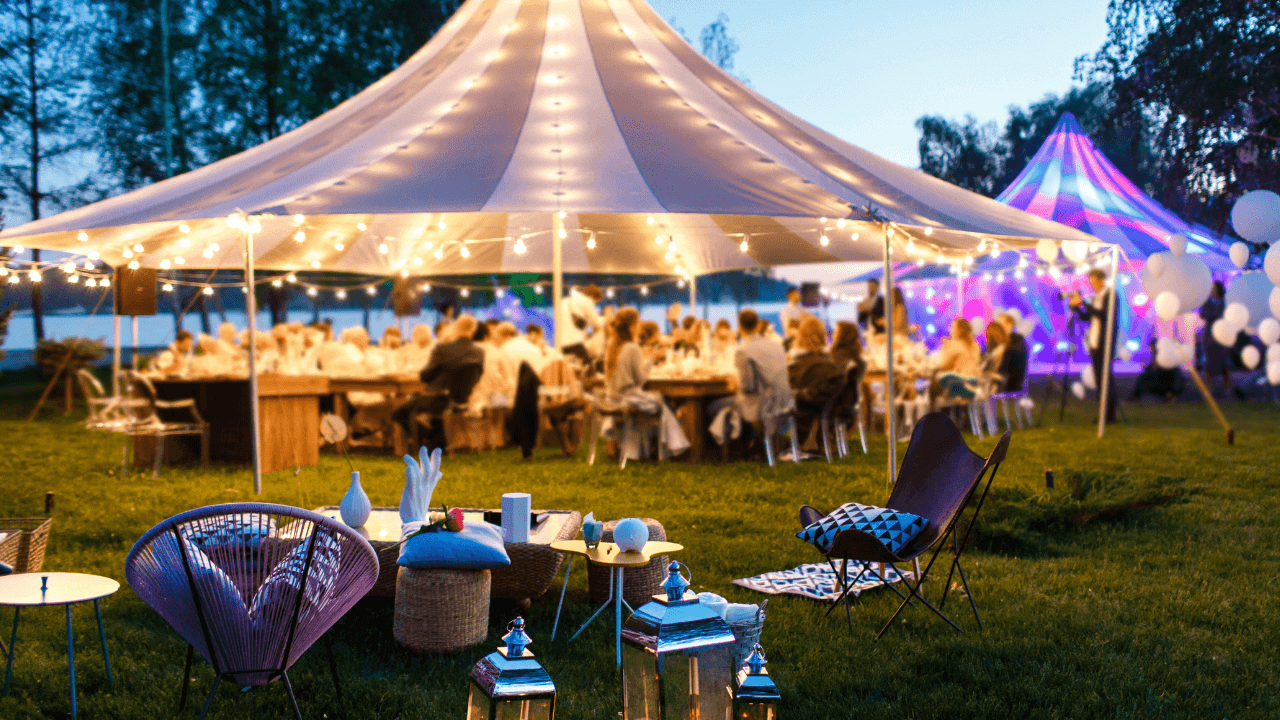Language:
75 Party Rental Business Ideas for Entrepreneurs

Hosting a party is always fun and exciting, but planning one can be quite daunting, especially when it comes to the equipment and supplies necessary to execute the perfect experience.
That is where party rental businesses come in.
The industry has grown significantly in recent years as people seek out more cost-effective ways to throw unforgettable parties.
In this guide, we’re going over top party rental business ideas and how to get started on your new venture.
With doola, you can easily register your party rental business and stay compliant with government regulations at all times by signing up for doola Formation.
Introduction to Party Rental Businesses
A party rental business is a type of service that provides customers with supplies for parties and events.
These businesses typically rent out items such as tables, chairs, linens, tents, lighting, sound systems, decorations, games, and other party supplies.
Party rental businesses may work with various clients, including individuals hosting weddings or birthday parties and corporate clients hosting large-scale events like conferences and trade shows.
A rental company may operate from a storefront, warehouse, or home-based location and may offer delivery, setup, and pickup services for the rented items.
The party rental industry can be highly competitive, and businesses must stay up-to-date with the latest trends and technologies to remain competitive.
This can include offering unique and specialized rental items, investing in marketing and advertising efforts, and providing exceptional customer service to build a loyal customer base.
Why Start a Party Rental Business?
Starting a party rental business can be a fun and lucrative way to turn your passion for events and creativity into a profitable venture.
With low startup costs, flexible business models, and high demand, there are many reasons why someone might consider starting a party rental business. Take a look at some of the most common motivations for getting into this field.
Recurring Revenue
A party rental business can provide recurring revenue as people often host multiple parties and events throughout the year.
By building relationships with your customers, you can become their go-to source for party rental needs, potentially leading to repeat business.
Low Startup Costs
Starting a party rental business can be relatively inexpensive compared to other types of businesses. You can start small by purchasing a few items for rental and gradually expanding your inventory as your business grows.
Opportunity to Differentiate
By offering unique and specialized rental items, you can differentiate your business from competitors and attract more customers.
For example, if there are several party rental businesses in your area, you might focus on a niche market like outdoor movie screens or vintage decor.
Seasonal Opportunities
Depending on your location, party rental businesses may have seasonal peaks during certain times of the year, such as the summer months, for outdoor events.
This can allow for strategic planning and resource allocation. It also means starting a party rental business can be a great side hustle!
Ability to Work With Different Types of Clients
Party rental businesses can work with various clients, from individuals hosting private events like weddings and birthday parties to corporate clients hosting large-scale events like expos and galas.
This diversity in clientele can provide more opportunities for revenue and growth.
Creative and Fun Work
Running a party rental business can be a fun and creative way to make a living.
You get to help people create memorable experiences and events, and you have the opportunity to work with a variety of different rental items and themes.
75 Party Rental Business Ideas

Below are 75 of the top rental items for indoor/outdoor events, parties, weddings, graduations, concerts, conventions, meetings, and more.
- Bounce House Rental
- Photo Booth Rental
- DJ Equipment Rental
- Table Rental
- Chair Rental
- Lighting Rental
- Tent Rental
- Glassware and Tableware Rental
- Sound System Rental
- Karaoke Machine Rental
- Movie Screen Rental
- Popcorn Machine Rental
- Cotton Candy Machine Rental
- Snow Cone Machine Rental
- Barbecue Grill Rental
- Dance Floor Rental
- Balloon Arch Rental
- Party Decoration Rental
- Bubble Machine Rental
- Chair Cover Rental
- Table Skirt Rental
- Portable Bar Rental
- Staging Rental
- Event Furniture Rental
- Red Carpet Rental
- Chocolate Fountain Rental
- Lemonade Stand Rental
- Portable Restroom Rental
- Arcade Game Rental
- Mechanical Bull Rental
- Sumo Suit Rental
- Dunk Tank Rental
- Zipline Rental
- Rock Wall Rental
- Water Slide Rental
- Obstacle Course Rental
- Interactive Game Rental
- Carnival Game Rental
- Table Tennis Rental
- Foosball Table Rental
- Air Hockey Table Rental
- Ping Pong Table Rental
- Giant Jenga Rental
- Giant Chess Rental
- Giant Connect Four Rental
- Yard Game Rental
- Silent Disco Party Equipment Rental
- Virtual Reality Rental
- Fire Pit Rental
- Outdoor Heating Equipment Rental
- Mini Golf Course Rental
- Axe Throwing Rental
- Wine Barrel Rental
- Hay Bale Rental
- Horse and Carriage Rental
- Centerpiece Rental
- Backdrop Rental
- Mobile Barista Rental
- Bubble Soccer Rental
- Mechanical Surfboard Rental
- Segway Rental
- Human Foosball Rental
- Skate Ramp Rental
- Go Kart Rental
- Mobile Escape Room Rental
- Inflatable Obstacle Course Rental
- Dessert and Cake Stand Rental
- Outdoor Game Rental
- Air Dancer Rental
- Photo Mosaic Wall Rental
- Digital Graffiti Wall Rental
- Selfie Mirror Rental
- Caricature Artist Rental
- Chocolate Fountain Rental
- Mobile Oxygen Bar Rental
11 Steps to Start a Party Rental Business
Starting a party rental business can be a fun and rewarding venture, but it requires careful planning and execution.
By following these steps, you can set yourself up for success and build a profitable business.
1. Conduct Market Research
Before starting a party rental business, it’s important to research your local market to determine the demand for rental services and the competition in your area.
You can gather information by conducting surveys, visiting local events, and talking to potential customers and industry professionals.
As a side note, make sure to keep an eye on popular trends that may affect the party rental industry, such as seasonal events or eco-friendly party supplies.
This can help you determine what types of rental items are most in demand, what pricing strategies to use, and what marketing tactics will be most effective.
2. Develop a Business Plan
A business plan is essential for any new business. It outlines your goals, target market, marketing strategy, pricing strategy, and financial projections. It also serves as a roadmap for your business, helping you stay focused and make informed decisions.
Your business plan should include details on your startup costs, projected revenue, and cash flow projections. You can use this plan to secure financing if needed.
3. Register Your Business
Register your business with your state or local government and obtain any necessary licenses and permits. This will ensure that your business is legally compliant and can operate without any legal issues.
You may also need to obtain insurance coverage to protect your business in case of accidents or damages.
4. Decide on a Business Entity
Your business structure will affect everything from your legal liability to how your business is taxed. It’s an important decision, so make sure to research each option carefully.
The most common types of business entities include sole proprietorships, partnerships, corporations, and Limited Liability Companies (LLCs).
Sole Proprietorship
Sole proprietorships are the simplest and most common type of business entity. As the owner of a sole proprietorship, you have complete control over the business and are personally liable for all its debts and legal obligations.
However, this also means that any profits the business makes are yours to keep.
Partnership
Partnerships involve two or more people who share ownership of the business. Like sole proprietorships, partnerships offer much control and flexibility, but they also come with personal liability for business debts and obligations.
Additionally, partnerships require a clear agreement between partners about how the business will be run, and they can be complicated to dissolve.
Corporation
Corporations are separate legal entities from their owners, and they provide the highest level of personal liability protection. However, they are also the most complex and expensive type of business entity to set up and maintain.
Additionally, corporations are subject to double taxation, meaning that profits are taxed at both the company and personal levels.
Limited Liability Company (LLC)
LLCs are hybrid entities that offer the personal liability protection of a corporation with the flexibility and simplicity of a partnership.
They are relatively easy and inexpensive to set up and maintain, and they offer pass-through taxation, meaning that profits pass through to the owners’ personal tax returns.
5. Purchase or Rent Equipment
Depending on your budget and the demand in your market, you may choose to purchase or rent the necessary equipment and supplies to start your party rental business.
Consider purchasing high-quality, durable items that will last over time and provide a good return on investment. You may also need to invest in a delivery vehicle or trailer to transport your equipment.
6. Establish a Pricing Strategy
Determine how you will price your rental items, considering factors such as the cost of the items, the rental period, and any delivery and setup fees.
You may want to offer discounts for longer rental periods or package deals for multiple items. It’s important to remain competitive in your market while still charging enough to make a profit.
7. Set up a Business Bank Account
Setting up a business bank account is an important step for any business owner, especially as your business grows and expands.
Having a business bank account ensures that your finances are separated from your personal finances, makes accounting and tax preparation easier, and improves your credibility with customers and vendors.
8. Develop a Marketing Plan
Develop a marketing plan that includes strategies for reaching your target market, such as social media advertising, flyers, and partnerships with event planners and other industry professionals.
Consider offering special promotions or discounts to attract new business and build a loyal customer base. Another solid strategy is to attend local events and trade shows to showcase your rental items and connect with potential customers.
9. Establish Delivery and Pickup Procedures
A major part of running a party rental business entails dropping off and picking up your party rentals and equipment. It may seem easy enough, but careful planning can help avoid potential hiccups.
Determine how you will deliver and pick up rental items and establish procedures for maintaining and cleaning the equipment.
Consider offering delivery and setup services to make it easier for customers to use your rental items. Also, make sure to have clear policies in place for late returns, damages, and cancellations.
10. Hire Staff
Depending on the size of your new party rental business at first and the amount of party rental equipment you’re looking to move around, you may or may not need to hire staff.
Having extra hands on deck can help you with the setup, delivery, and pickup of rental items. This can include drivers, event coordinators, and customer service representatives.
Make sure to train your staff on proper handling and maintenance of rental items to ensure they are in good condition for each customer.
11. Launch Your Business
Once you’ve completed the above steps, it’s time to launch your party rental business and begin marketing your services to potential customers.
Monitor your cash flow and adjust your pricing and marketing strategies as needed to ensure profitability. Also, continuously assess and improve your business to stay competitive in your market.
Get Started Building Your Party Rental Business With doola

By signing up for doola Formation, you will not only ensure that your party rental business is compliant with the regulations but will also get access to tools and resources that will put your business on a growth trajectory.
Entrepreneurs from around the world trust doola to manage their books, keep them compliant and offer top-quality service in handling the administrative side of your business with the doola Total Compliance package.
Sign up today to turn your party rental business dream into a reality.
FAQ
How do I start a party rental business?
Before starting a party rental business, it is important to research the market and identify potential customers. You will also need to purchase equipment, establish a pricing structure and develop a marketing plan.
What kind of party rental equipment should I offer?
The type of rental equipment you offer will depend on your target audience and the types of events you plan to cater to. Some popular rental items include tables, chairs, linens, tents, and decor.
What are some tips for promoting my party rental business?
Social media platforms such as Facebook and Instagram are effective tools for promoting your rental business. It is also helpful to attend local events and network with other event professionals in your area.
How much should I charge for my rental equipment?
It’s important to research your local market and competitors to develop a pricing structure. Consider factors such as the cost of equipment acquisition, maintenance, and delivery fees.
Do I need insurance for my party rental business?
Yes, it’s important to have liability insurance for your rental business to protect yourself in case of accidents or damage to rental equipment during use. Consult with an insurance agent to find the right coverage for your needs.





